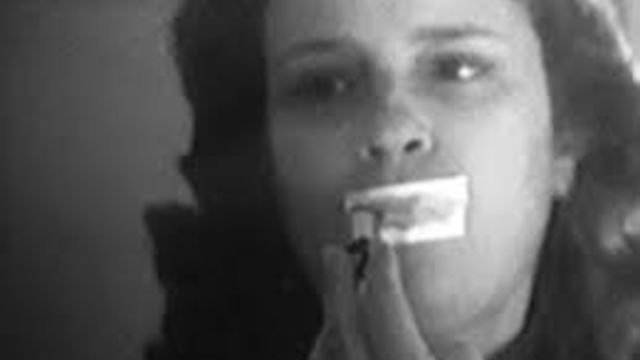
Letícia Parente
Born in Salvador, Brazil, in 1930, Letícia Parente began her art training at a mature age, studying printing techniques at the Núcleo de Artes e Criatividade after moving to Rio de Janeiro in 1971. Until then Parente had concentrated on teaching chemistry. Despite her later achievements in the art world, Parente never abandoned her first career. In 1972 she completed a master's degree in analytical chemistry at Pontifícia Universidade Católica do Rio de Janeiro, and in 1976 she obtained the title Livre Docente (equivalent to a PhD) in inorganic chemistry at the Universidade Federal Fluminense in Rio de Janeiro. She published numerous articles and books on the subject and taught in higher-education institutions in Brazil and Italy. Known for her work in video, Parente also created prints, drawings, paintings, photographs, and mail art. Her first solo exhibition, in the city of Fortaleza in 1973, presented a series of monotypes.
While in Rio de Janeiro in the mid-1970s she became involved with the artists Ana Vitória Mussi (b. 1943), Anna Bella Geiger (b. 1933), and Sonia Andrade (b. 1935) and the artist, critic, and curator Paulo Herkenhoff (b. 1949) and the artist, critic, and professor Fernando Cocchiarale (b. 1951), who are considered to be pioneers of Brazilian video art. In 1975 Parente created her first videos—In (In), Preparação I (Preparation I), and Marca registrada (Trademark)—which announced themes that would remain central to her practice: the body and subjectivity and the female condition in a sexist culture. In Marca registrada, her best-known piece, the camera follows the artist as she embroiders, with needle and black thread, the words "Made in Brasil" on the sole of her foot.
Critical of traditional roles assigned to women, Parente nevertheless started her career by focusing ironically on domestic spaces and activities considered feminine, such as sewing, applying makeup, and taking care of clothing. In 1976, with the groundbreaking exhibition Medidas (Measurements), Parente turned her attention to science. Realized at the Museu de Arte Moderna do Rio de Janeiro, Medidas is considered the first exhibition in Brazil to combine science and art. The artist invited the public to use a series of scientific (or pseudoscientific) devices to assess their physical, intellectual, and emotional conditions, exposing both the power and the limitations of scientific methods to assess, classify, and regulate individuals' bodies and subjectivities.
Still in the 1970s, she created drawings, photocopy works, and mail art. She continued making videos and works on paper in the 1980s. Parente's pieces were selected for important exhibitions in Brazil and abroad, such as the 16th Bienal de São Paulo (1981); International Open Encounter on Video Art (1975, 1976, 1978, 1979), organized by the Center of Art and Communication, Buenos Aires; and Pioneers of Brazilian Video Art, 1973–1983 (2004), organized by the J. Paul Getty Museum, Los Angeles. She was awarded first prize at the Salão de Abril (1973), in Fortaleza. The artist died in 1991 at age sixty-one.
—Mariana von Hartenthal
Selected Solo Exhibitions
1973 Letícia Parente: Monotipias, Universidade Federal do Ceará, Fortaleza, Brazil
1976 Letícia Parente: Medidas, Museu de Arte Moderna do Rio de Janeiro
2007 Letícia Parente: Preparações e tarefas, Paço das Artes, São Paulo
2011 Letícia Parente: Arqueologia do cotidiano; Objectos de uso, Oi Futuro, Rio de Janeiro
Selected Bibliography
Da Costa, Luiz Cláudio. "A tesoura, a seringa e as medidas: O efeito arquivístico na arte contemporânea." In Transcinemas, edited by Kátia Maciel, 303–13. Rio de Janeiro: Contra Capa, 2009.
Friques, Manoel Silvestre. "Origens, registros e deslocamentos em Marca Registrada." Concinnitas: Revista do Instituto de Artes da Universidade do Estado do Rio de Janeiro 11 (December 2010): 159–71.
Machado, Arlindo, ed. Made in Brasil: Três décadas do vídeo brasileiro / Three Decades of Brazilian Video. São Paulo: Iluminuras; Itaú Cultural, 2007.
Parente, André, ed. Preparações e tarefas: Letícia Parente. São Paulo: Paço das Artes, 2007.
Parente, André, and Katia Maciel, eds. Letícia Parente: Arqueologia do cotidiano; Objectos de uso. Rio de Janeiro: +2 Editora, 2011.


